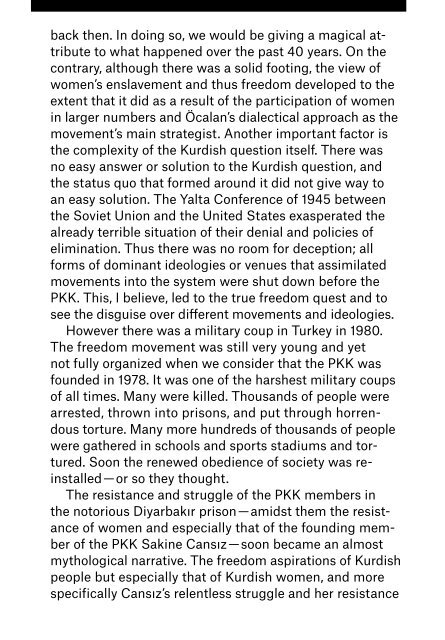Stateless Democracy
1RHiH4Y
1RHiH4Y
You also want an ePaper? Increase the reach of your titles
YUMPU automatically turns print PDFs into web optimized ePapers that Google loves.
ack then. In doing so, we would be giving a magical attribute<br />
to what happened over the past 40 years. On the<br />
contrary, although there was a solid footing, the view of<br />
women’s enslavement and thus freedom developed to the<br />
extent that it did as a result of the participation of women<br />
in larger numbers and Öcalan’s dialectical approach as the<br />
movement’s main strategist. Another important factor is<br />
the complexity of the Kurdish question itself. There was<br />
no easy answer or solution to the Kurdish question, and<br />
the status quo that formed around it did not give way to<br />
an easy solution. The Yalta Conference of 1945 between<br />
the Soviet Union and the United States exasperated the<br />
already terrible situation of their denial and policies of<br />
elimination. Thus there was no room for deception; all<br />
forms of dominant ideologies or venues that assimilated<br />
movements into the system were shut down before the<br />
PKK. This, I believe, led to the true freedom quest and to<br />
see the disguise over different movements and ideologies.<br />
However there was a military coup in Turkey in 1980.<br />
The freedom movement was still very young and yet<br />
not fully organized when we consider that the PKK was<br />
founded in 1978. It was one of the harshest military coups<br />
of all times. Many were killed. Thousands of people were<br />
arrested, thrown into prisons, and put through horrendous<br />
torture. Many more hundreds of thousands of people<br />
were gathered in schools and sports stadiums and tortured.<br />
Soon the renewed obedience of society was reinstalled<br />
— or so they thought.<br />
The resistance and struggle of the PKK members in<br />
the notorious Diyarbakır prison — amidst them the resistance<br />
of women and especially that of the founding member<br />
of the PKK Sakine Cansız — soon became an almost<br />
mythological narrative. The freedom aspirations of Kurdish<br />
people but especially that of Kurdish women, and more<br />
specifically Cansız’s relentless struggle and her resistance<br />
in the face of the horrendous torture to which she was<br />
subjected, paved the way for women to play a major role<br />
in the days to come.<br />
While at the beginning, the women’s struggle within<br />
the PKK did not transcend the borders of the old left, it<br />
could also not be contained by them. Öcalan’s role here is<br />
important, both as a strategist and as the political leader<br />
of the Kurdish movement. He did not ignore the enslavement<br />
of women nor their desire and struggle for freedom.<br />
Despite negative reactions from some male members<br />
of the organization, Öcalan opened up political, social,<br />
cultural, ideological, organizational space for women.<br />
He stood strongly by this.<br />
Women joined the guerilla forces from the beginning<br />
because of the sexism they faced in feudal tribal structures<br />
as well as the fury they felt in the face of increasing<br />
colonialist and exploitative oppression against the Kurds by<br />
the Turkish Republic. People from all walks of life came to<br />
wage a common struggle. Yet coming together and joining<br />
a revolutionary movement was not on its own enough<br />
to overcome the attitudes inherited from colonialist and<br />
feudal structures. Problems began to emerge, especially<br />
in the approach towards women; there was an attempt at<br />
regenerating traditional roles amongst the guerilla forces<br />
and party structures. There were those women who accepted<br />
the regeneration of these roles and there were also<br />
women who rejected them. Thus, realizing the severity of<br />
the problem, the organization established the Union of the<br />
Patriotic Women of Kurdistan (YJWK) in 1987. The foundation<br />
of this union was the very first declaration of intent to<br />
target a unique and separate women’s organization.<br />
In the nineties, there was a huge influx of women in<br />
the guerilla forces. This compelled the formation of a new<br />
organization within the guerilla forces. In 1993, the very<br />
first all-women units were formed. This meant that women<br />
60–61



